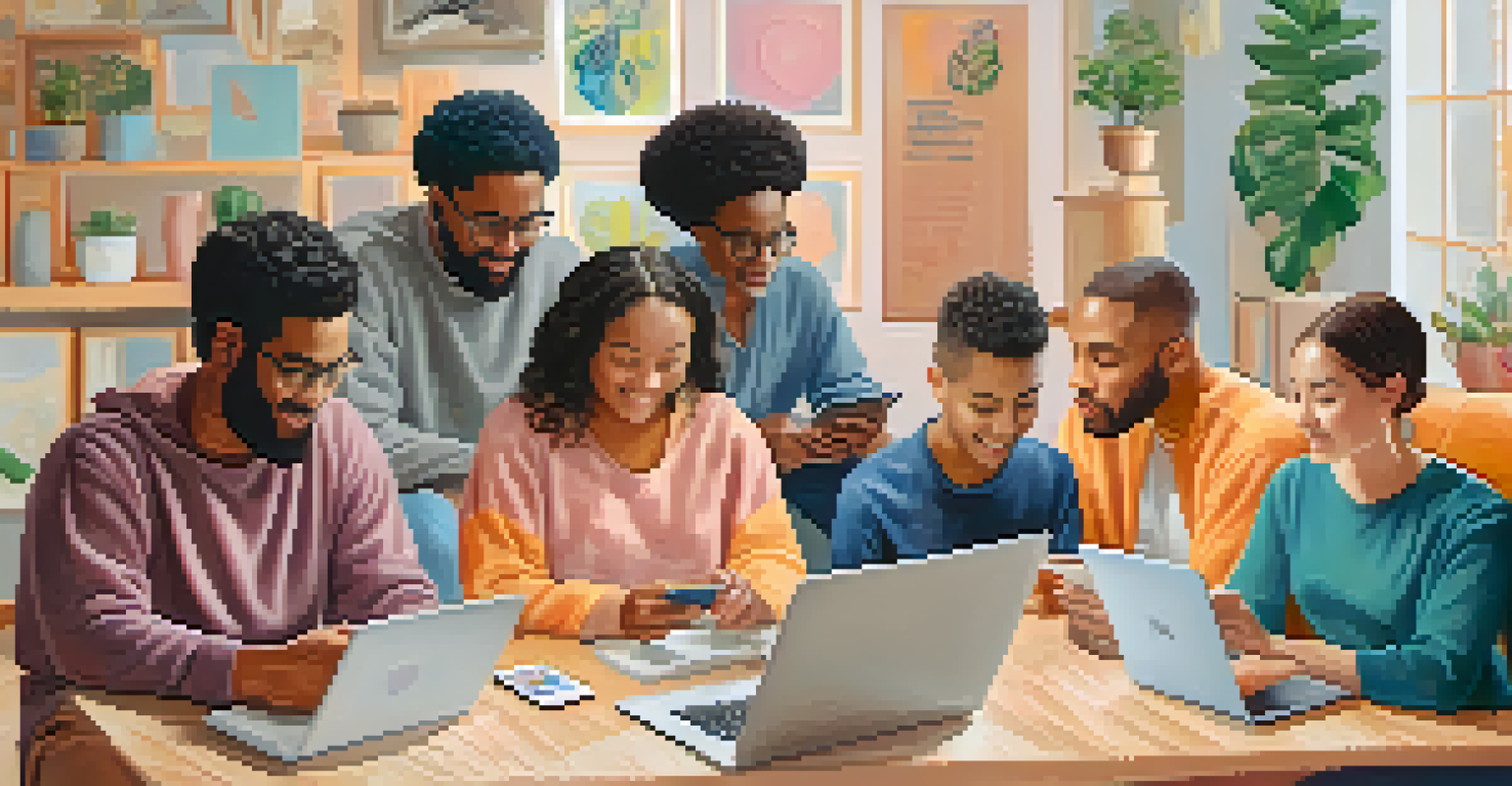The Influence of Technology on Mental Health in Modern Society

Understanding the Digital Landscape and Mental Health
In today's world, technology is woven into the fabric of our daily lives. From smartphones to social media, our digital interactions can significantly influence our mental well-being. While technology offers tools for connection and support, it also presents challenges that can affect our mental health negatively.
Technology is a double-edged sword. It can connect us, but it can also isolate us.
For instance, constant notifications and the pressure to be 'always on' can lead to anxiety and stress. Many individuals find themselves overwhelmed by the sheer volume of information they consume daily. This overload can contribute to feelings of inadequacy, especially when comparing oneself to others online.
Yet, this same technology can foster communities and provide resources for those struggling with mental health issues. Online platforms can connect individuals with support groups and mental health professionals, highlighting the dual-edged nature of technology's impact on our lives.
Social Media: A Double-Edged Sword for Mental Health
Social media is one of the most significant technological influences on mental health today. While it allows for connection and the sharing of experiences, it can also lead to negative feelings such as jealousy and depression. Scrolling through curated feeds often creates unrealistic expectations and a sense of missing out.

For example, research shows that excessive use of social media can lead to lower self-esteem and increased feelings of loneliness. Users may find themselves trapped in a cycle of comparison, leading to dissatisfaction with their own lives. This emotional toll can be particularly acute among younger users who are still developing their identities.
Technology Affects Mental Health
Digital interactions can both enhance and challenge our mental well-being.
However, social media can serve as a platform for advocacy and awareness, helping to destigmatize mental health issues. Many influencers and organizations use these platforms to share resources and personal stories, encouraging open conversations about mental health, which can be incredibly beneficial.
The Role of Online Therapy and Mental Health Apps
Online therapy and mental health apps have gained immense popularity, particularly in recent years. These platforms provide convenience and accessibility for those seeking help, breaking down geographical barriers to mental health care. With just a few clicks, individuals can connect with qualified professionals or access self-help resources.
The greatest weapon against stress is our ability to choose one thought over another.
For example, apps like Headspace and Talkspace offer mindfulness exercises and virtual therapy sessions, making mental health support more approachable. This can be especially vital for those who may feel uncomfortable seeking help in person. Having support at their fingertips can empower individuals to prioritize their mental well-being.
Nonetheless, it’s essential to approach these resources with caution. Not all apps are created equal, and some may not provide adequate support. Users should ensure that any mental health resource is evidence-based and that they’re working with licensed professionals for therapy.
The Impact of Screen Time on Mental Health
Screen time has become a central topic in discussions about mental health, especially with the rise of remote work and online schooling. While technology can enhance productivity and learning, excessive screen time can lead to a host of mental health issues, including anxiety, depression, and sleep disturbances. Finding the right balance is crucial.
For instance, studies indicate that children and adolescents who spend extended periods in front of screens may experience increased feelings of isolation and sadness. The lack of face-to-face interactions can hinder social skill development and emotional intelligence. It’s vital for parents and guardians to monitor and limit screen time.
Social Media's Mixed Impact
While social media connects us, it can also lead to feelings of inadequacy and loneliness.
On the flip side, engaging in screen time that promotes positive interaction, such as video calls with friends or family, can enhance emotional connections. The key is to use technology mindfully, focusing on quality interactions rather than quantity.
Technology's Role in Fostering Resilience and Coping Skills
Despite the challenges technology poses, it can also be a powerful tool for fostering resilience and developing coping skills. Many mental health apps provide guided meditations, mood tracking, and cognitive behavioral therapy techniques that empower users to manage their mental health proactively. These resources can be game-changers for those struggling.
For example, apps that encourage journaling or mindfulness can help individuals process their emotions and develop healthier coping strategies. This proactive approach to mental health can lead to improved emotional regulation and stress management. Technology, when used thoughtfully, can support personal growth and resilience.
Moreover, online communities can provide support and encouragement, allowing individuals to share their experiences and coping strategies. This sense of belonging can significantly enhance one’s ability to cope with life’s challenges, showcasing the positive potential of technology.
The Importance of Digital Detox for Mental Clarity
In a world so deeply connected through technology, the concept of a digital detox has gained traction. Taking breaks from screens and social media can lead to improved mental clarity and emotional well-being. It’s a reminder that sometimes stepping back is necessary to reset and recharge.
Many people report feeling more present and engaged in their daily lives after a digital detox. Disconnecting from the barrage of information allows for deeper connections with the people and environment around them. This can reduce anxiety and foster a greater sense of peace.
Digital Detox for Mental Clarity
Taking breaks from screens can improve mental clarity and overall emotional well-being.
Digital detoxes can be as simple as setting aside specific times of the day to unplug or embarking on a weekend retreat without devices. These intentional breaks can cultivate a healthier relationship with technology, blending the benefits of connectivity with the need for mental space.
Future Trends: Technology and Mental Health Integration
As we look to the future, the integration of technology and mental health is likely to evolve. Innovations such as virtual reality therapy and AI-driven mental health support are on the horizon, offering exciting possibilities for treatment and support. These advancements could make mental health care more personalized and effective.
For example, virtual reality therapy can simulate real-life scenarios for individuals to practice coping strategies in a safe environment. This immersive experience can enhance traditional therapeutic approaches, making them more engaging and impactful. As technology continues to advance, the potential for innovative mental health solutions grows.

However, it’s crucial to approach these advancements with mindfulness and ethical considerations. Ensuring that technology serves as a complement to, rather than a replacement for, traditional therapy will be vital in maintaining a holistic approach to mental health care.